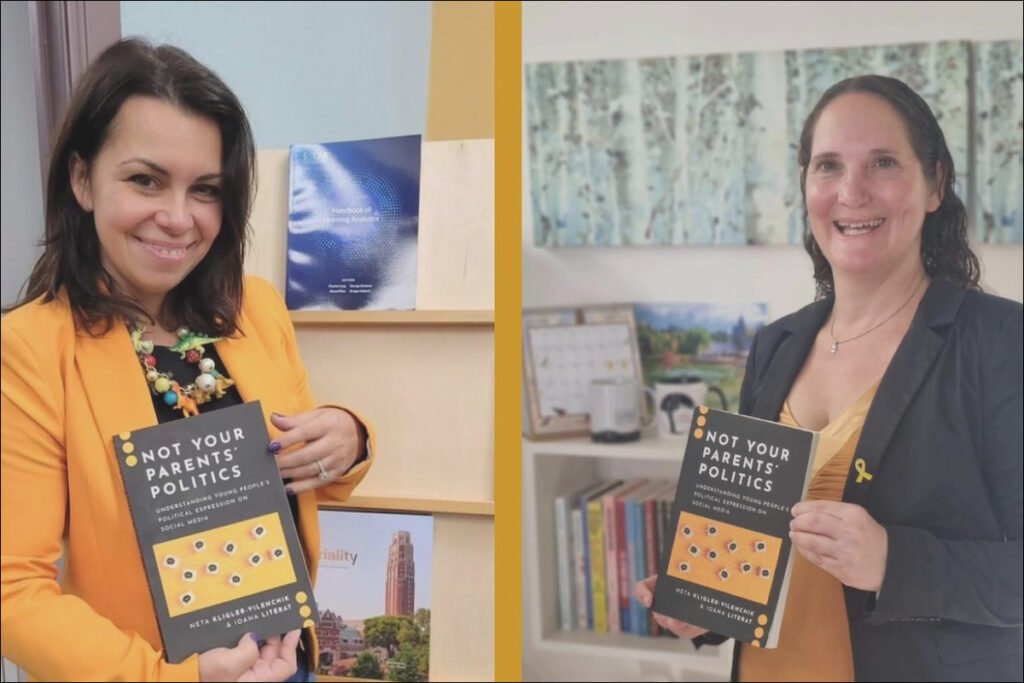Ioana Literat (left) and Neta Kligler-Vilenchik (right) smile and pose with their new book Not Your Parents’ Politics. (Photos courtesy of those pictured)
In a world where the discourse surrounding adolescents and social media intricately dances between concern and curiosity, the prevalent narrative often highlights the negatives—yet, two academic trailblazers, Ioana Literat and Neta Kligler-Vilenchik, embark on a powerful inquiry into the vibrant political expressions harnessed by youth within the digital realm. Their insightful book, Not Your Parents’ Politics: Understanding Young People’s Political Expression on Social Media, wades into this complex and evolving landscape.
Literat, with her roots steeped in online creative expression and the arts, has long championed the significance of youth voices in political discourse, zeroing in on platforms like TikTok, where a staggering 40% of young individuals turn for news. Meanwhile, Kligler-Vilenchik, observing the shifting tides of youth political engagement since 2016, complements this exploration with her own expertise in communication.
As they navigate through more than eight years of rigorous research, Literat and Kligler-Vilenchik argue compellingly for recognizing and valuing the political critiques of the younger generation. Their work prompts us to reflect: what constitutes a “good” citizen in this digital age? How can we nurture the political inclinations of our youth?
Amidst a polarized political landscape, where social media’s footprint is both vast and intricate, their exploration is timely. Young people, often misunderstood in their humorous and irreverent political commentaries, break the mold of conventional political discourse, challenging the norms of seriousness and detachment. “Sadly, young voices tend to fly under the radar, and their social media activism often faces unwarranted scorn,” Kligler-Vilenchik notes poignantly.
Case in point: the Kamala Harris campaign’s bold strategy of reaching out to Gen Z through TikTok’s vibrant culture, attempting to tap into fleeting internet sensations like the viral coconut tree meme. However, despite this engaging approach, the turnout of young voters at the polls faltered compared to previous years. “Though the campaign harnessed social media’s power to converse with the youth, the relationship between online engagement and actual voting behavior is far from straightforward,” Literat reflects post-election.
This very dichotomy illustrates a broader trend: the dynamic interplay between online expression and real-world implications. While Harris’s campaign left a significant digital imprint, Literat emphasizes the need for sustained engagement rather than mere fleeting moments of virality. “Winning the moment may not translate into winning the vote, yet campaigns that emerge in platforms like TikTok empower youth to envision themselves as integral to the political fabric,” she asserts.
As the duo intricately weaves their argument, they call for a shift in the narrative. Rather than dismissing the emotional vibrancy of youth expression, Literat passionately advocates for amplifying these voices, noting the detrimental effects on democracy when dismissive attitudes prevail. “Let’s not undermine their perspectives; instead, let’s elevate and respect them,” she urges.
Of course, they also acknowledge the labyrinthine nature of social media politics, which can deepen societal divides. “In a world where your political affiliation is worn like a badge, genuine dialogue has become scarce,” Literat remarks. Yet, she believes there remains hope for rapprochement. “At our core, we share fundamental desires for a better life, for our loved ones to be treated justly,” she reflects earnestly.
Explore the mosaic of youth political expression and discern what shapes a “good” citizen in the age of TikTok with Not Your Parents’ Politics, a poignant examination that challenges existing paradigms while beckoning us to listen more closely to the voices of the future.

